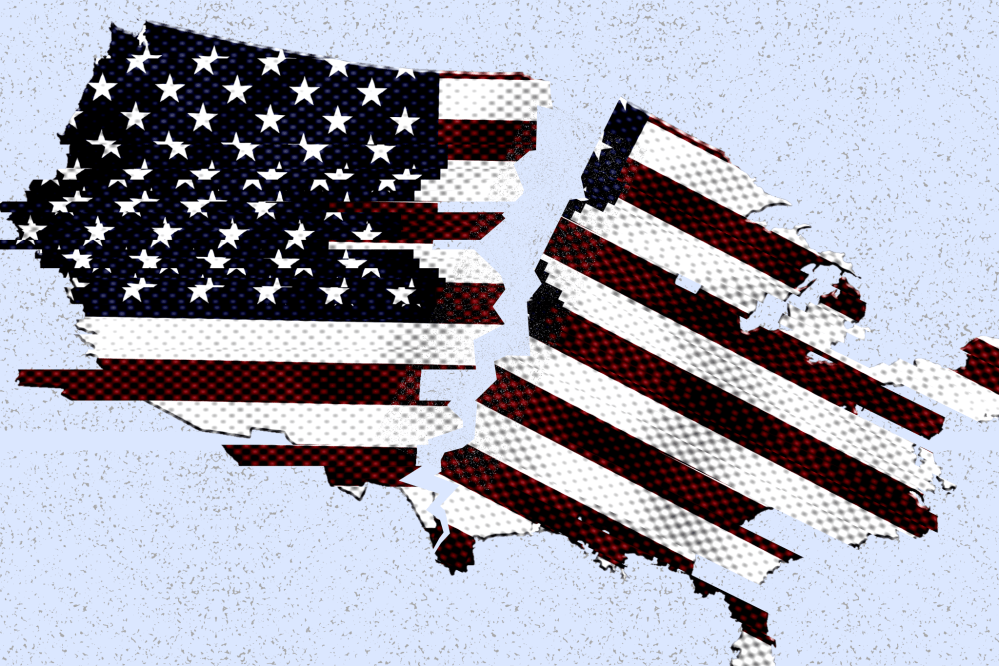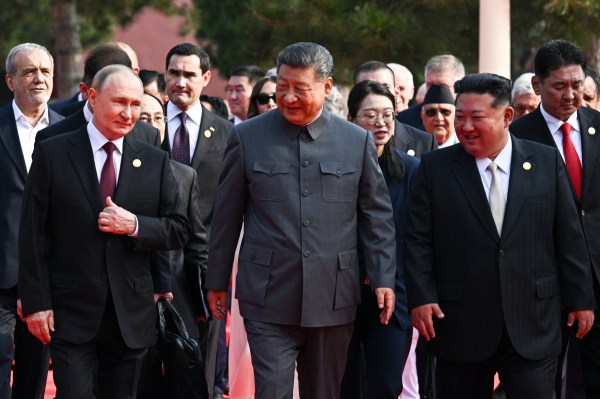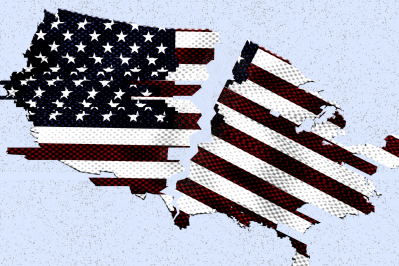Earlier this month, I wrote about Kilmar Abrego Garcia, an immigrant who was granted protected status in the United States yet shipped off anyway to an El Salvadoran dungeon. A lawyer for the government acknowledged that Garcia had been deported in error—and was promptly placed on leave from Donald Trump’s Justice Department for his honesty—but maintained that there’s nothing to be done about it now that he’s in the custody of another country.
Yesterday, the Supreme Court knocked that down. Ruling unanimously, the nine justices ordered the Trump administration to “facilitate” Garcia’s release and “ensure that his case is handled as it would have been had he not been improperly sent to El Salvador.”
The odds that the president will follow that ruling can’t be more than 50-50.
He might follow it. Leaving a man to rot in a third-world hellhole due to a government screw-up would be so dystopian that the White House may conclude that defying the order is more trouble than it’s worth. If you’re going to challenge the judiciary’s authority to tell the president what to do, you don’t want to fight that political battle in a matter where the court is obviously right and the administration is obviously wrong.
But “he might follow it” is as much confidence as I can muster. The new reality of American governance is that anything can happen and probably will. All bets are off.
On Wednesday, with alarm growing about the fate of Garcia and other dubiously deported dungeon-dwellers, Homeland Security Secretary Kristi Noem sneered, “We’re confident that people that are [imprisoned in El Salvador] should be there, and they should stay there for the rest of their lives.” The rest of their lives? Three-quarters of the deportees have no criminal record, and not one seems to have received any judicial process before being “sentenced” to indefinite confinement.
In the United States, even duly convicted murderers don’t always do life. But Noem understands that ruthless fascist bravado is what’s expected of her. That mindset will inform how the administration responds to the Supreme Court’s ruling. All bets are off.
The same is true in Congress. Last week, Sen. Mike Lee offered his own opinion about the inmates’ predicament when he responded to a Twitter meme that read “Visit Canada: We won’t throw you into an El Salvadoran gulag without due process!” The senator, a former law clerk for Samuel Alito, replied sternly: “We absolutely will. Don’t come here illegally.”
Garcia wasn’t here illegally. That’s sort of the point. But even if he were, nothing says “all bets are off” like watching Mike “Mr. Constitution” Lee boast that his country is now willing to ignore basic procedural rights designed to ensure that an accused man actually is who the government says he is.
With allies like Noem and Lee egging him on to be “tough,” whether Trump will comply with the Supreme Court’s order or ignore it is anyone’s guess. But, importantly, it’s also anyone’s guess how the public will react if he opts for defiance. While the idea of a president ignoring court rulings is very unpopular in the abstract, Trump and his right-wing propaganda apparatus have yet to bring the full weight of their influence to bear in normalizing the idea. If he flouts the court in Garcia’s case, insisting that deterring illegal immigration is a matter of saving the country and that “He who saves his Country does not violate any Law,” would you be terribly shocked if 45 percent of the country or so ended up in his corner?
I wouldn’t. All bets are off—not just with respect to Trump but with respect to the American people. That’s the message global markets sent this week when they continued canceling their bets on U.S. securities even after the “Liberation Day” tariffs were paused. Markets have lost confidence that our country, from top to bottom, is capable of behaving sensibly. They’re right to do so. Frankly, it’s overdue.
Risk premium.
Most of the commentary criticizing Trump’s trade idiocy and the damage it’s caused has dwelled on the fact that the crisis is self-inflicted. That’s not the most salient fact about it, but it’s certainly true.
To see just how true, have a gawk at this chart tracking the U.S. Economic Policy Uncertainty Index since 2005. A once-in-a-lifetime catastrophe like the COVID pandemic, in which global commerce shut down entirely, caused considerably less economic uncertainty than two-and-a-half months of American populist rule-by-whim has.
Some investors aren’t sticking around to see how much more unpredictable things might get.
What convinced Trump that it was time for a trade war “pause,” reportedly, was the chaos in bond markets overnight on Tuesday that caused yields on U.S. treasuries to rise. Yields don’t typically climb when equities are being routed; in a crisis, nervous investors tend to start buying up treasuries, viewing them as the ultimate financial safe haven. The unexpected rise in yields on Tuesday indicated that treasuries—a lot of them—were being sold. That was a potential financial crisis in the making.
So the president blinked, pausing his tariffs on everyone except China. Except that treasury yields … kept rising. The dollar has weakened too, creating an extra hidden “tax” for Americans on certain foreign imports as investors turned to gold and Swiss francs instead. According to the investment bank Evercore, only four times in the past 30 years has the dollar dropped by more than 1.5 percent while the yield on 30-year treasuries has risen by at least 10 basis points. Typically, that sort of crunch is only seen in emerging markets. This week it happened to us.
In Evercore’s words, the trends reflect “evaporating U.S. growth exceptionalism and the reduced attraction at the margin of dollar assets for reserve purposes amid erratic U.S. decision-making.” Or, in plain English from the analysts at ING: “(The) more troubling narrative of late is the notion of what we call a ‘sell America Inc.’ risk. … (The) here and now is painting treasuries as a tainted product, and that’s not comfortable territory.”
Investors are “selling America” because America is no longer a stable investment. Anything can happen. All bets are off. We chose to behave like a third-world country when we reelected Trump, so that’s how markets have begun to treat us. The bill is coming due.
I suspect treasury yields will remain elevated even if he abandons his trade war entirely because the risk of “erratic U.S. decision-making” will remain so long as he’s president. No one would be surprised, for instance, if the president turned around tomorrow and fired Federal Reserve Chairman Jerome Powell in a fit of pique because Powell isn’t lowering interest rates fast enough for the White House’s liking. Nor would anyone be shocked if Trump announced he’s raising tariffs on China to 500 percent because he simply must win his staring contest with Xi Jinping, never mind what that would mean for American consumers or for American companies that rely on Chinese components for their manufacturing.
Dumb as the president’s trade war might be in principle, there would be some reason for investors to feel confident in him if he were waging it skillfully, at least. He isn’t. Trump admitted to reporters that he paused his tariff scheme because markets were getting “yippy,” not because (as so many of his aides pretended) it was all part of some master plan. No one seems to understand what the endgame is of his escalating tariff tit-for-tat with China, but as rates rise, it’s going to compel a sudden, total, wrenching decoupling of our two countries’ economies.
Nor can anyone explain the strategic logic of alienating friendly countries by tariffing the world only to turn around and narrow the target to Beijing. The U.S. can’t match China’s manufacturing capacity alone; it needs partners, and might have had them if Trump hadn’t needlessly picked a fight with them. Instead, Xi is capitalizing on Trump’s stupidity by inviting European leaders to join him in resisting Trump’s “bullying,” and the European Union is sufficiently interested to have begun planning a summit with the Chinese leader in July. U.S. allies are beginning to diversify their geopolitical portfolio in the same way investors diversified their bond portfolios this week, and for the same reason.
Anything can happen in an America led by Donald Trump. The United States is an increasingly risky place to do business—or even to visit—and that risk is now being priced into treasuries. The more the president behaves like a third-world caudillo—by ignoring court orders, say—the higher the risk premium markets will demand to invest here. We will not remain the world’s reserve currency after placing dimwitted Orbánists at the helm of the most powerful country in history, nor should we—2029 is a long way away.
But even when (if?) Trump and the other dimwits leave office, the new American risk premium we saw this week won’t dissipate entirely. You and I will bear the financial and political costs of it for the rest of our lives, because the source of American instability ultimately isn’t the administration. It’s the people who elected it.
An obvious solution.
As I said, the fact that the trade crisis has been self-inflicted isn’t its most distinctive characteristic.
What distinguishes it from other national crises is that the solution in this case is obvious and readily available. It doesn’t require a trillion-dollar bailout, as the 2008 financial meltdown did, or a global shutdown, as the pandemic did, or a years-long war on terror, as September 11 did.
In theory, all it would take to re-stabilize global trade and significantly reduce the riskiness of American investments is for Congress to repeal Trump’s “emergency” tariff powers. Presidents move quickly and boldly, but legislatures move slowly and deliberately, offering just the sort of “no sudden moves” assurances that investors are begging for. Nothing would blunt the spike on that skyrocketing Economic Uncertainty Index like putting tariffs back in the hands of a body so inert that its default consensus on funding the federal government has become “whatever we did last time.”
The United States isn’t yet so much of an autocracy that the legislature has to let itself and the country be taken hostage by an autarkist madman who believes, and I quote, that “trade is bad.” It has cards to play and a political justification to play them. New data from the University of Michigan released Friday shows that consumer sentiment in the U.S. has dropped to its second-lowest level since the early 1950s; only in the summer of 2022, when inflation was rising amid a pandemic hangover, did the number dip lower—and even then, only slightly lower. Never once during the Great Recession were consumers more pessimistic than they are now.
Yet we all recognize that Congress won’t act. Amid a crisis grave enough to threaten the dollar’s global reserve status, with a fix at its fingertips that could be achieved in a day or two of floor votes, our representatives won’t do a single meaningful thing to solve the problem. It’s unthinkable that they would.
Which is a pretty grave crisis in its own right, no?
It isn’t like this in other countries. Three years ago, Liz Truss became prime minister of the United Kingdom and announced a plan for tax cuts on higher earners. Markets revolted. The pound dipped. Truss backed off amid the convulsions, but it was too late: She was forced out after 50 days, making her stint as leader the shortest in British history. Nowadays, she’s mostly known to Americans for turning up at CPAC to cheer Trump on and mutter about “the deep state.”
Britain’s system is parliamentary, of course, and so Truss wasn’t entitled to a fixed term in office like the president is. But the analogy is useful because of how differently the public there reacted to an economic crisis foisted on it by its own leadership. Within weeks of Truss’ tax-cuts proposal, and despite the fact that the Conservative Party was popular enough to have led the country for more than a decade at that point, a full 77 percent of Britons said they disapproved of the government. The same poll found 87 percent believed Truss and her team were handling the economy badly.
The American mind cannot comprehend that degree of public unanimity over a controversial policy plan announced by the ruling party’s leader. In the United States, intense negative partisanship plus a steady diet of right-wing “bubble” media would have given Truss a polling floor in the low 40s, I expect. Conservative MPs would have been terrified of ousting her, not wanting to be seen by the base as having handed a scalp to the libs. Right-wing voters would insist that they “fight” for her or else.
No wonder she digs the vibe at MAGA events like CPAC so much.
Trump is in a bit of polling trouble over his tariffs, as you’d expect, but it doesn’t begin to approach the backlash that Truss faced. Days after “Liberation Day” tanked markets, Morning Consult found support for tariffs down since December—but by only 8 points, thanks to “steady” support from Republicans. YouGov recorded a respectable-ish 43 percent job approval for the president on the strength of 90 percent support from Republicans. And although “soft” Trump voters are clearly getting antsy about the economy and prices, MAGA voters—the diehards who show up for primaries—have remained rock solid.
A meaningful segment of the American electorate simply does not respond rationally anymore to negative feedback about their side’s policies the way Britons did with Truss, and that segment is highly motivated to punish party legislators who do. The saddest thing you’ll read today is this Washington Post story about Trump voters grasping for excuses to stick with the president as he sets their savings on fire. One, in her mid-60s, saw her pension fund drop by eight percent and contemplated having to delay retirement, but no worries: “If this is what it takes to make other countries treat us fair, then I am okay with that,” she told the paper.
What could someone like Senate Majority Leader John Thune reasonably say to convince someone like her that “fairness” is a lot more complicated than Trump has led her to believe?
Being a Republican lawmaker in 2025 means that if you choose to act in the obvious best interests of your constituents and your country yet defy the president’s wishes in doing so, all you’ll get for your good deed is venomous vilification by your party’s activist class and its millions of followers. Even if populist worms hadn’t eaten Mike Lee’s brain, one can understand why he’s not interested in reintroducing his 2017 bill to claw back presidential tariff powers, as The Dispatch’s John McCormack reported today. That way lies nothing but misery and professional hardship.
Why bother trying to save people from Trump who not only don’t want to be saved, but will hate you for trying?
An ‘us problem.’
And so here we are, trapped in a crisis that risks a recession or something worse by inane policies that a supermajority of House and Senate members surely recognize as inane and destructive—yet they won’t act. A critical mass of American voters in thrall to demagogic populism, whose highest political priority is punishing any resistance to Donald Trump, has raised the stakes of defiance such that Republican lawmakers hoping to protect the country must choose political suicide in order to do so.
That’s not a “Trump problem.” That’s an “us problem.”
The civic and intellectual defects of populism will endure after he’s gone. This is the week that markets began to price that reality into American securities in earnest. Congress could act—but it won’t. There’s not enough appetite in the United States for sane governance and too much appetite for a crank’s rule-by-whim.
Speaking shortly before the U.S. presidential election last year, a French minister declared, “We cannot leave the security of Europe in the hands of voters in Wisconsin every four years.” That’s haunting and correct. You cannot base the stability of the global economic order or the defense of the Western liberal order on a population that’s now roughly as likely to elect Tucker Carlson president as it is Josh Shapiro.
The American people have become a risky bet. They’ll either need to pay more to entice foreigners to invest in them going forward, or they’ll need to learn to get used to less investment, but it’s one or the other. The world no longer has confidence in us, and it shouldn’t. Elections have consequences.
By the way: I’ll be off next week, returning on April 21. No worries, though. I’m sure nothing will happen while I’m gone.







Please note that we at The Dispatch hold ourselves, our work, and our commenters to a higher standard than other places on the internet. We welcome comments that foster genuine debate or discussion—including comments critical of us or our work—but responses that include ad hominem attacks on fellow Dispatch members or are intended to stoke fear and anger may be moderated.
With your membership, you only have the ability to comment on The Morning Dispatch articles. Consider upgrading to join the conversation everywhere.